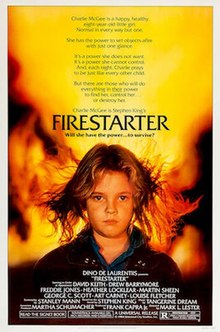Firestarter (1984 film)
| Firestarter | |
|---|---|
 Theatrical release poster | |
| Directed by | Mark L. Lester |
| Written by | Stephen King |
| Produced by | Frank Capra Jr. Martha De Laurentiis |
| Starring | Drew Barrymore David Keith George C. Scott Freddie Jones Heather Locklear Martin Sheen Moses Gunn Art Carney Louise Fletcher |
| Cinematography | Giuseppe Ruzzolini |
| Edited by | David Rawlins Ronald Sanders |
| Music by | Tangerine Dream |
| Distributed by | Universal Studios |
Release date | May 11, 1984 |
Running time | 114 min |
| Country | United States |
| Language | English |
Firestarter is a 1984 science fiction thriller film based on the novel of the same name by Stephen King. The plot concerns a young girl who develops pyrokinesis and the secret government agency which seeks to control her. The film was directed by Mark L. Lester, and stars Drew Barrymore and David Keith. The movie was filmed in and around Wilmington, Chimney Rock, and Lake Lure, North Carolina.
A miniseries follow-up to the film, titled Firestarter 2: Rekindled, was released in 2002 on SCI FI.
Differences from the book
The book makes considerably greater reference to Rainbird's Native American heritage and his elaborate rationalizations for wanting to personally kill Charlie McGee than the film does. Rainbird has experimented with peyote and is fascinated with thoughts about the meaning of death, mysticism, and metaphysical secrets. He believes that if he looks into Charlie's eyes at the moment of her death, he will learn something about the nature of the universe. In the film, as critic Gene Siskel observed, Rainbird comes across as an ordinary garden-variety child molestor.
In the scenes involving the early life of Charlie's parents, the atmosphere of the 1960s is invoked far more often than in the film, which may explain why in the film Charlie at the conclusion reports her story to The New York Times rather than to Rolling Stone as she does in the novel.
There are also many small differences between the book and the film:
- In the book, Rainbird lost his eye in Vietnam, in the movie, he just wore an eyepatch.
- In the book, Charlie gets the change from the payphones. In the film, Andy does this.
- In the book, Charlie accidentally sets the soldier's boots on fire at the airport while getting the payphone coins. In the film, she plainly concentrates upon him, as if sending out the power to burn him.
- The "fire-training" scene from the book is entirely different in the film.
- The scene at Manders' farm is much more graphic and detailed in the book.
- The Manders' house does not burn down as it does in the book.
- In the book, Rainbird has a discussion with Dr. Wanless before killing him. In the film, Rainbird kills him as soon as he wakes him.
- In the book, Rainbird suffocates Dr. Wanless, but in the film, he breaks his nose into his brain.
- In the book, Charlie is tranquilized by Rainbird at Granther's cabin, while Andy is shot by Jules. In the film, Jules is absent and Rainbird shoots both with the tranquilizer gun.
- In the book, Cap only sees Charlie personally when escorting her back to her room. In the film, he comes to her the very first day of her captivity, offering gifts and other such things.
- In the book, Pynchot talks with Andy after Andy "pushes" himself out of his Thorazine addiction. In the film, Cap talks with him instead.
- In the book, Andy and Pynchot have a discussion out by the lake, where Andy "pushes" him. In the film, the discussion is between Andy and Cap.
- In the book, Cap is "pushed" while in his office. In the film, he is "pushed" during a lakeside conversation with Andy - which, in the book, took place between Andy and Pynchot, rather than Cap.
- The scenes of Pynchot's "push" and "ricochet" are absent from the film.
- In the book, Pynchot commits suicide. In the film, Pynchot is presumably killed while trying to escape one of Charlie's fireballs.
- In the book, Andy's note to Charlie warns her about Rainbird's betrayal. In the film, this portion of the note is absent, and Charlie even tells Rainbird about the escape plan the note detailed.
- In the film, Charlie's stay at the Manders' farm at the end of the book is absent.
- In the book, the Shop shows signs of regrouping (new leader, closing in on Manders' farm, etc). In the film, these scenes are absent, and the Shop may be presumed to be gone once and for all.
- In the book, Charlie leaves the Manders' farm alone to tell her story. In the film, Irv Manders accompanies her.
- In the film, the mailman was murdered by Rainbird. In the book, the mailman was robbed of his mailbag, and allowed to live.
Cast
- Drew Barrymore as Charlie McGee
- David Keith as Andy McGee
- George C. Scott as John Rainbird
- Freddie Jones as Dr. Joseph Wanless
- Heather Locklear as Vicky McGee
- Martin Sheen as Captain "Cap" Hollister
- Moses Gunn as Dr. Pynchot
- Art Carney as Irv Manders
- Louise Fletcher as Norma Manders
See also
- Ojos de fuego, an Argentine short film
External links
- 1984 films
- 1980s science fiction films
- American science fiction films
- Psychological thriller films
- Supernatural thriller films
- English-language films
- Films shot in North Carolina
- Films based on Stephen King's works
- American action thriller films
- Films directed by Mark L. Lester
- 1980s action films
- 1980s thriller films
- Universal Pictures films
- Thriller film stubs
